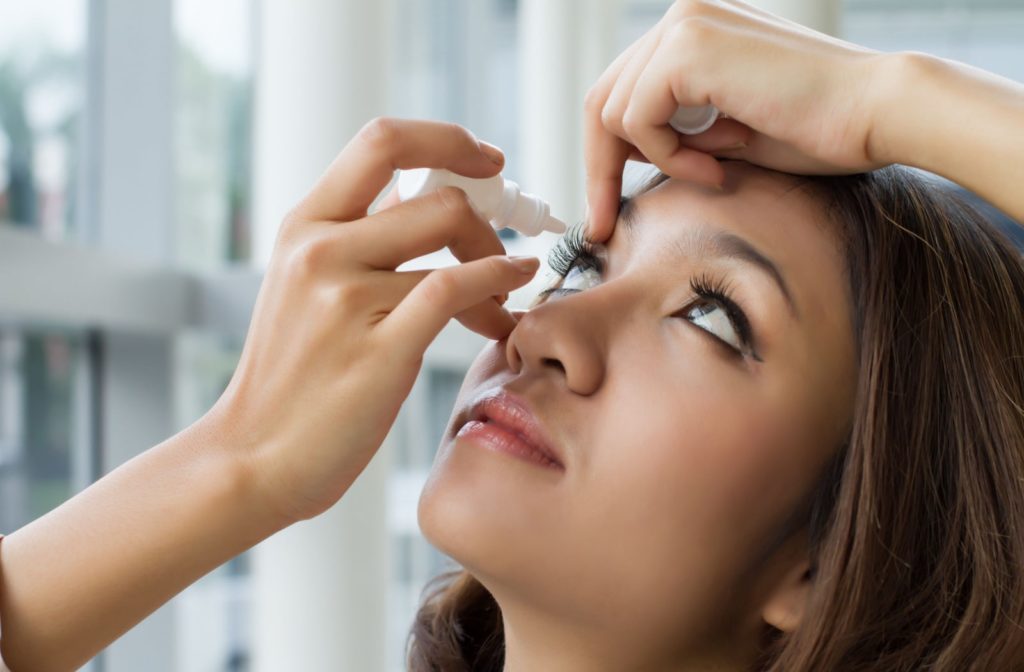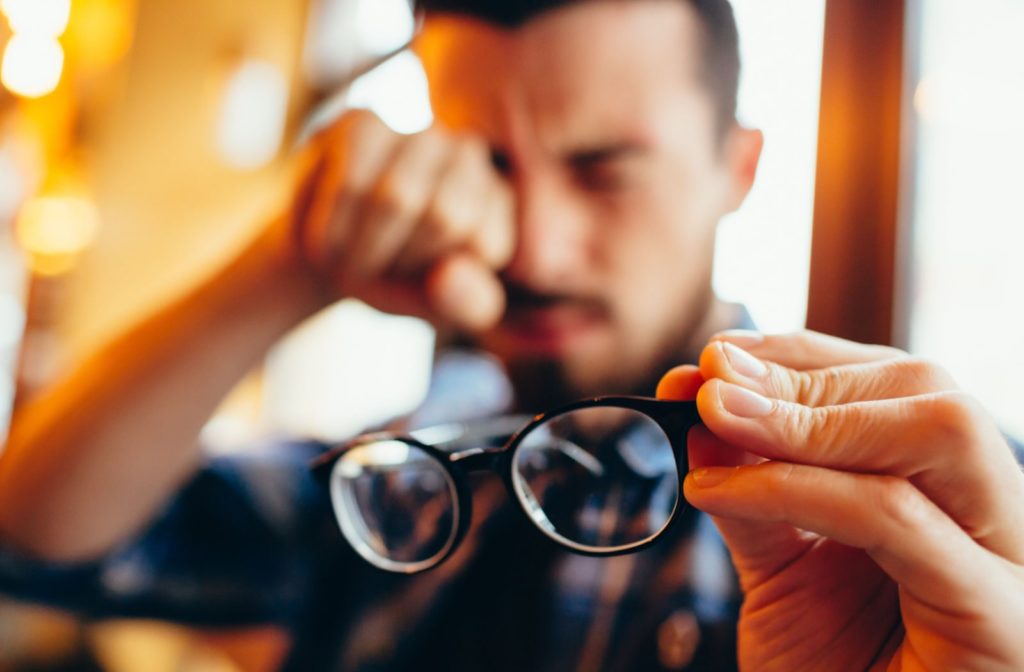Millions of Canadians deal with the uncomfortable symptoms of dry eyes annually. Dry, irritated eyes are typically the most common symptom, but you may also experience blurry vision, light sensitivity, or feeling like there is something in your eye.
Several treatments exist for this uncomfortable condition if over-the-counter (OTC) eye drops aren’t enough to relieve symptoms. Your eye doctor can perform a comprehensive eye examination to determine the cause of your dry eyes.
This article helps shed light on what dry eye disease is, symptoms to expect, and some treatments available. But perhaps most importantly, we’ll review a few prevention tips to keep your eyes comfortable and your vision clear.
What Is Dry Eye Disease?
Dry eye disease is a condition—typically chronic—that affects your eye’s tear quality. Many refer to it as simply dry eye, and there are two major subtypes: evaporative and aqueous deficient. Each presents with many overlapping or similar symptoms; the root cause of each is the primary difference.
Evaporative dry eye is typically the result of a lack of oil in the tear film. This imbalanced film results in premature evaporation of your tears.
In contrast, aqueous deficient dry eye has nothing to do with the tear mixture but the amount of tears produced. With this form of dry eye, your eyes simply don’t produce enough tears to keep your eyes adequately protected and lubricated.
Common Symptoms
As mentioned above, there’s some overlap in symptoms, and they may include:
- Stinging, burning, or irritated eyes
- Red eyes
- Feeling like there is something in your eye
- Trouble wearing contact lenses
- Trouble with night vision
- Light sensitivity
- Eye fatigue
Can Dry Eyes Cause Blurriness?
Another common symptom that can accompany dry eyes is blurry vision. One reason for this is that your blurry vision may accompany eye fatigue if your eyes are left untreated.
Another significant reason could be your eye having trouble focusing. Your tear film directly affects your vision clarity because of how it helps the eye focus light. You could be at a higher risk of blurred vision with an abnormal tear film from dry eye.

Treating Dry Eye
With many cases of dry eye, OTC eye drops are often enough to provide much-needed relief to your eyes. Unfortunately, this won’t cure the condition, but dry eye treatment also doesn’t revolve around a cure as much as symptom relief.
One thing to remember is to use preservative-free drops for extended use. Otherwise, you may find the eye drops giving you some of the symptoms they are supposed to relieve.
If eye drops aren’t adequate, other dry eye treatment options include:
- Medication: Your doctor may prescribe medicated eye drops or even oral medications. The type of medication depends on the cause of your dry eye. For example, your doctor may prescribe something to reduce inflammation or fight infection.
- Diet changes: Researchers have directly linked several aspects of our eye health to diet. In regards to dry eye disease, a diet rich in essential fatty acids and vitamin E can be the most beneficial.
- Punctal plugs: One possible way to treat dry eye symptoms is to prevent tears from draining. Punctal plugs are a common method of doing this. With aqueous deficient dry eye, these plugs may show the most benefit.
- Specialty contact lenses: People with severe dry eye symptoms are often limited in which contact lenses they can wear. Scleral lenses are an example of a specialty lens that can help improve symptoms because of their design.
- Eye mask: Some eye doctors use an eye mask in-office or as an at-home treatment. Meibomian gland dysfunction is a common culprit for evaporative dry eye. A heated eye mask could be beneficial and help unclog your glands.
Finding Relief from Dry Eyes
You may not be able to completely prevent dry eye disease, but there are some things you can do to reduce the severity of symptoms and lessen the chances of them flaring up.
Things you can do to prevent uncomfortable symptoms include:
- Using a humidifier in your room or office
- Using OTC lubricating eye drops (preservative-free)
- Eating a healthy diet with lots of essential fatty acids and vitamin E
- Making sure you’re wearing contact lenses as directed by your optometrist
Discuss Your Symptoms with Your Eye Doctor
There isn’t a one-size-fits-all solution to dealing with dry eye disease and the symptoms that may accompany it. Each person may find different things that cause symptoms to flare up, and some people might find them more or less severe than others.
Our eye doctors at Eye Effects can examine your eyes and help determine the cause of your symptoms. With a fuller picture of your eye health, we can recommend a treatment to get your eyes feeling good again. Reach out to book an appointment with our team today.


